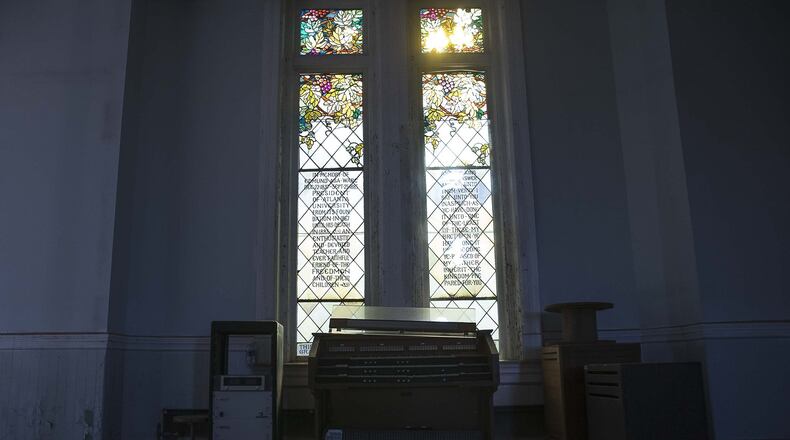The windows are boarded up inside in the Morris Brown College classroom where W.E.B. DuBois wrote “A Litany of Atlanta” in 1906 in response to the Atlanta Race Massacre.
Fountain Hall, nearly 140 years old, has sat dormant and decaying for more than a decade.
But there is hope.
The private college received $500,000 from the National Park Service Historically Black Colleges and Universities Grant Program to start the process of restoring all of the windows in the building, including two stained glass windows honoring Atlanta University’s Founder Reverend E. A. Ware and his wife Jane Twichwell Ware.
Last year, the college received $500,000 from the park service to repair the building’s roof, iconic bell tower and clock face.
Credit: Photo by Stan Coleman
Credit: Photo by Stan Coleman
“Fountain Hall is our iconic symbol of strength and perseverance,” said the college’s president, Kevin James. “Students who went to Morris Brown experienced so many milestones in that building. We are going to need that building.”
Once a key member of the Atlanta University Center, Morris Brown College became a shell of its former self after losing its Southern Association of Colleges and Schools accreditation in 2003 because of financial mismanagement. The school filed for bankruptcy in 2012.
Loss of accreditation meant the loss of federal funding, which meant the loss of students who depended on financial aid. At its peak, Morris Brown had a student body of 2,700 students in the mid-1990s.
Now, 75 students are enrolled there — an improvement over the 20 it had in 2019. This past spring, the Virginia-based accreditation agency Transnational Association of Christian Colleges and Schools approved Morris Brown’s application for candidacy status, though the school is not yet accredited.
“But we are restoring Morris Brown one brick at a time,” said James.
Founded in 1881 by the Georgia Conference of the African Methodist Episcopal Church and named for one of its bishops, Morris Brown was the first institution of higher education in Georgia created by Black people for Black people.
Credit: alyssa.pointer@ajc.com
Credit: alyssa.pointer@ajc.com
Fountain Hall, originally named Stone Hall, was built in 1882 by Atlanta University on the crest of Diamond Hill, one of the highest points in the city. The four-sided clock atop Fountain Hall can be seen for miles and rang every hour.
Atlanta University used the three-story, red brick, High Victorian-style building from 1882 until 1929 primarily as an administration building, chapel and library.
Du Bois’ office, which he maintained from 1897 to 1910 while teaching at Atlanta University, was in Fountain Hall. It was made a National Historic Landmark in 1975.
Credit: BEN GRAY / AJC
Credit: BEN GRAY / AJC
Inside the building today, the rooms are littered with peeling paint, shattered windows and dead squirrels. What hasn’t been vandalized has deteriorated in the years since the building was functional.
The windows project could total as much as $1 million, and the school still has to raise millions more to completely restore Fountain Hall, said R. Candy Tate, who wrote the grant as the chair of the Hallowed Grounds Committee of the Atlanta Branch of the Association for the Study of African American Life and History.
“In the grand scheme of things, we have raised a lot of money in grants, but this is a $30 million project,” Tate said.
In May, the college announced that Chick-fil-A was awarding Morris Brown $500,000 to train student leaders.
There are also nascent plans for Hilton to build a hotel on campus. And, maybe one day, Morris Brown will rejoin the Atlanta University Center Consortium, a collective of the city’s historically Black colleges.
In 2019, Morris Brown was awarded $75,000 by the National Trust for Historic Preservation to hire consultants to advise on raising funds for the restoration of Fountain Hall
“We are hopeful,” James said. “We believe that, as we are showing our resurrection, corporate donors will begin pouring in for Fountain Hall, because they will see a good project.”
On October 23, they will hear it.
In the middle of a raging pandemic and without a football program or even electricity in Fountain Hall, Morris Brown plans to hold homecoming, the annual return of alumni to campus that Black colleges look forward to all year.
For the first time in more than two decades, the bell enclosed in the clock with four new faces will ring out across Diamond Hill.
“That bell hasn’t been heard in 25 years,” James said. “It would mean so much to so many.”
About the Author
Keep Reading
The Latest
Featured







